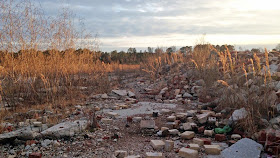APRIL 21, 2015
RALEIGH, NORTH CAROLINA
North Carolina officials are advising dozens of residents
near Duke Energy coal ash dumps not to drink or cook with water from their
wells after tests showed contamination with toxic heavy metals.
The state Department of Environment and Natural Resources
said Tuesday that tests of 87 private wells near eight Duke plants showed
results that failed to meet state groundwater standards.
A state law passed after last year's massive spill into the
Dan River required wells within 1,000 feet of Duke's 32coal ash dumps across
the state to be tested. About 145 private wells have been sampled since
October.
Tom Reeder, the assistant secretary overseeing water quality
for the state, said Duke will be required to provide the affected residents
with an alternative water supply if it is determined coal ash is the source of
the contamination.
The agency's first public acknowledgement of the troubling
test results came after The Associated Press reported 19 homeowners and a
church near Duke's Buck Steam Station outside Salisbury had received written
warnings.
Several of the letters cited high levels of vanadium, a
naturally occurring element found in oil and coal. In a 2011 regulatory filing,
Duke reported releasing about 1.5 million pounds of vanadium into the
environment from its power plants.
According to documents obtained by AP, test results from
private drinking-water wells near the plant showed readings for vanadium as
high as 86 times the state groundwater standard.
The International Agency for Research on Cancer has
determined that vanadium is "possibly carcinogenic to humans."
Studies show lab animals exposed to high oral doses of vanadium suffered
neurological and developmental problems.
In addition to Buck, the state said it had test results from
private wells that failed to meet groundwater standards near Duke's Allen,
Asheville, Belews Creek, Cliffside, Marshall, Roxboro and Sutton facilities.
Duke spokeswoman Erin Culbert said the chemicals found in
the private wells could be naturally present in local soils.
"Based on the state's test results we've reviewed thus
far, we have no indication that Duke Energy plant operations have influenced
neighbors' well water," Culbert said.
The nation's largest electricity company, Duke stores more
than 150 million tons of coal ash in 32 dumps at 14 power plants in North
Carolina.
In February, federal prosecutors charged Duke with nine criminal
counts over years of illegal pollution leaking fromash dumps at five of the
plants. The company has said it intends to plead guilty to the charges and pay
$102 million in fines and restitution.
A separate state law passed in the wake of the Dan River
spill requires the company to move or cap all of its dumps by 2029.
The company has three open-air pits at Buck that cover 134
acres and contain more than 5 million tons of coal ash. The ash is a byproduct
of burning coal to generate electricity. It contains numerous toxic heavy
metals, including mercury, lead and arsenic.
Many residents living near the plant in the close-knit rural
community of Dukeville have long been concerned that Duke's coal ash might be
making them sick. AP reported in June that well testing by an environmental
group found readings for potentially toxic chemicals associated with coal ash
at levels exceeding state groundwater standards.
Though similar readings were recorded from Duke's own
monitoring wells, both the company and state health officials said last year
there was no evidence the contaminates were coming from the coal ash pits.
Among those who received a state letter about their well
water are James and Levene Mahaley, who have lived near the Buck plant since
1954. Test results from their well show readings for vanadium as high as 26
parts per billion — 86 times the state groundwater standard of 0.3 parts per
billion.
In an interview, the couple said three Duke Energy employees
came to their house in November and told them the company was going to start
providing them bottled water. But, the couple says, they were asked to keep the
shipments secret from their neighbors.
"They asked us to not say anything," recounted
Levene Mahaley, 83. "Just don't mention it, that we're getting water. I
was surprised, but we didn't ask any questions at the time."
Asked about the incident, Culbert said the company was
"not aware of any expectation" that the Mahaleys keep quiet.
John Suttles, a senior attorney at the Southern
Environmental Law Center, said the latest test results confirm what
environmental groups suing Duke over its pollution have been saying in court
for years.
"Duke's coal ash pits are leaking toxic pollutants into
groundwater," Suttles said. "This news underscores the critical
importance of removing coal ash from leaking, unlined pits to dry, lined
storage away from our waterways and drinking water sources."
Source: http://www.citizen-times.com


